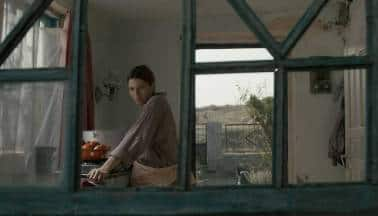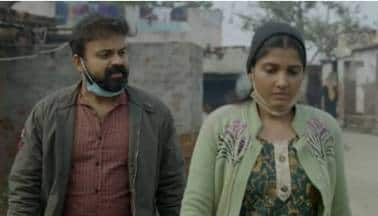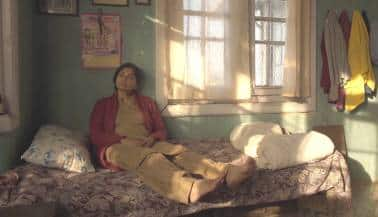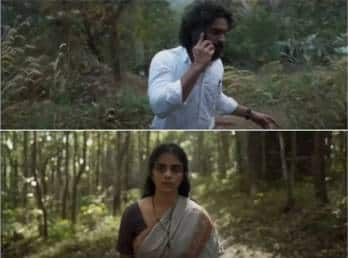



When Deepika Suseelan, the 27th International Film Festival of Kerala's (IFFK’s) new artistic director, was returning home from work one day, eagerly awaiting what turned out to be a video call with the Hungarian master Béla Tarr, with regard to his travel arrangements to Kerala, she saw surprise on his face. He had already accepted the offer of receiving the Lifetime Achievement Award at IFFK, which returns to its regular calendar schedule this week, from December 9-16.
 Hungarian auteur Béla Tarr.
Hungarian auteur Béla Tarr.
“What usually happens with greats like him or international celebrities who are called to participate on short notice is the inevitable feeling that ‘I might be a replacement’. The PR teams of celebrities usually drop such calls. I directly reached out to him in September, since I had contacted him earlier as well. I was unsure, since he’s usually travelling and has his own personal projects running, but he graciously and warmly accepted. However, when he saw me later, on the call that day, he was surprised, since I don’t look like an ‘artistic director’ of a festival. I had to reassure him that this wasn't any prank,” Suseelan laughs.
The eminent Tarr, whose films are slow/languid, deeply philosophical, allegorical, melancholic, and he, as dubbed by an American critic, a “despiritualised Tarkovsky”, will receive Rs 10 lakh prize money and a sculpture. And a retrospective will showcase six of his films: Szabadgyalog (The Outsider, 1981), A londoni férfi (The Man from London, 2007), Családi tüzfészek (Family Nest, 1979), Werckmeister harmóniák (Werckmeister Harmonies), 2000, A torinói ló (The Turin Horse, 2011) and Kárhozat (Damnation, 1988). A book in Malayalam on the auteur by CS Venkiteswaran will be published, too.
After her earlier stint of seven-and-a-half years with the festival, and having been the programme assistant to Bina Paul, the former artistic director of IFFK, Suseelan returns to IFFK in the capacity of an artistic director for the 27th edition. She has been the head of programmes at the International Film Festival of India (IFFI) for three years, conceiving and curating the 50th edition of IFFI in Goa, and then was programming for the Durban International Film Festival.
In her second stint, Suseelan joined IFFK in September and had less than two months to put together the festival. But she was confident, to do it single-handedly. She had no programmers. “It’s very special to curate for the Malayali audience here, they are cinema literate, and want to see certain kind of films, so, it is very challenging to meet their expectation, one has to be up-to-date and do their homework well, but you are subconsciously aware or have a fair idea of the kind of films they’d be expecting,” says Suseelan, who has sourced films from across the globe, from Asia to Latin America.
"One has to stay updated, watch as many films of the year as possible, from across the globe, find the gems, chase the filmmakers on Facebook, etc., but the most tedious job is to persuade them to share/submit their film screeners,” she adds. That she had to lock the festival by November meant she had to watch a lot of films in a very short time. But, as she says, “for most films, if it doesn’t grab your attention in the first 20-30 minutes, chances are that they aren’t worth the while. But that’s not always true; there are, of course, exceptions. One has to have a nose for it.” She had three other members to support her in watching and shortlisting world cinema submissions. Usually, “what a sales agent does is send in four other films along with that one film a festival programmer asked for.” The task escalates.
 Martin Scorsese's 'Taxi Driver', written by Paul Schrader.
Martin Scorsese's 'Taxi Driver', written by Paul Schrader.
To the great dismay of Paul Schrader fans, and Suseelan too, he was supposed to be present for the opening ceremony of IFFK, unfortunately, he developed health issues after his Venice visit. The Cat People (1982) director and Taxi Driver (1976) screenwriter received the Golden Lion for Lifetime Achievement at the 79th Venice International Film Festival this year. His cardiologist asked him not to travel. If his health permits, a live online video “In Conversation” will be held with a top south Indian veteran actor. Suseelan is tight-lipped about it just yet. Schrader’s retrospective of five films will be shown at IFFK: Taxi Driver, The Last Temptation of Christ (1988), Master Gardener (2022), First Reformed (2017), and Mishima: A Life in Four Chapters (1985).
There will also be a showcase of five Spanish surreal films of the Chilean-French Alejandro Jodorowsky: Poesía sin fin (Endless Poetry, 2016), La Danza de la Realidad (The Dance of Reality, 2013), Santa Sangre (Santa Sangre, 1989), La montaña sagrada (The Holy Mountain, 1973), and El Topo (The Mole, 1970). The festival will also spotlight the silent era. While you can explore German Expressionism with the play of light and shadow in five films of FW Murnau: Tabu: A Story of the South Seas (1931), Sunrise: A Song of Two Humans (1927), Faust (1926), The Last Laugh (1924), and Nosferatu (1922); there will be live music by Jonny Best (resident pianist at the British Film Institute’s Southbank theatre and Royal Society of Arts Fellow) to accompany Nosferatu and four more silent films by other directors, including The Parson’s Widow (1920) and Foolish Wives (1922).
 FW Murnau's 'Nosferatu' (1922).
FW Murnau's 'Nosferatu' (1922).
The country in focus is Serbia. There will be a showcase of four Emir Kusturica’s films: Promise Me This (2007), Underground (1995), Life is a Miracle (2004), Black Cat, White Cat (1998), in addition to six Serbian films made between 2020-22: Working Class Heroes, The Beheading of St John the Baptist, Oasis, Father, As Far as I Can Walk, A Cross in the Desert. Suseelan says, “One has heard of master like Kusturica, but I was eager to know who their contemporary filmmakers are. Serbia has never been done at IFFK. No festival, in fact, has exclusively focussed on the country, except, perhaps, Visions du Réel, Switzerland’s biggest documentary festival. Serbian cinema is evolving just the way Malayalam film industry is at this point, where young filmmakers are doing incredible work. I saw No One’s Child (2014) some years back, and I decided that if ever the ball were in my court, I’ll be focussing on the country.”
 Miloš Pušić-directed Serbian film 'Working Class Heroes' (2022).
Miloš Pušić-directed Serbian film 'Working Class Heroes' (2022).
The day IFFK released its lists of films, delegate registrations started pouring in, and has already crossed 11,000 — “way more than the festival can accommodate,” says Suseelan. Around 184 films — including 33 by women filmmakers — from 70 countries will be shown across 14 screens for delegates, and one additional screen for the jury and film fraternity, in Thiruvananthapuram. There will be three screenings of the competition films. There will be night screenings too, of two “crowd-puller” films per day, and one midnight screening, of the Joko Anwar-directed Indonesian film Pengabdi Setan 2: Communion or Satan’s Slaves 2: Communion (2022), the sequel to the 2017 film Satan’s Slave.
The Kaleidoscope category will feature eight films, including Aamir Bashir’s Kashmir-Urdu Maagh/The Winter Within, Nandita Das’ Toronto-premiered Zwigato, Prithvi Konanur’s Kannada Hadinelentu/Seventeeners and India’s Oscar entry Pan Nalin’s Gujarati Chhello Show/Last Film Show.
While Nalin’s film is not an Oscars nomination, ask her whether that matters as a marker for shortlisting films and Suseelan says, “I don’t believe an Oscar nomination winner is the best film from that country. We have, for instance, the powerful Jean Luc Godard(2022) as part of the international competition.” Klondike tells the story of a Ukrainian family living on the Ukraine-Russia border at the start of the war. “The incredible actor (Orkana Cherkashyna) is scheduled to represent the film at IFFK,” she adds.
 Orkana Cherkashyna in the Ukrainian film 'Klondike' (2022).
Orkana Cherkashyna in the Ukrainian film 'Klondike' (2022).
Coming to the three sought-after main categories of IFFK, the International Competition comprises 14 films, including Utama (Spanish), Tug of War (Swahili), Memoryland (Vietnamese), and four Indian (the Manipuri Eikhoigi Yum, Lijo Jose Pellissery’s Nanpakal Nerathu Mayakkam, Mahesh Narayanan’s Ariyippu/Declaration, and Ektara Collective’s Ek Jagah Apni).
 Ektara Collective's 'Ek Jagah Apni'.
Ektara Collective's 'Ek Jagah Apni'.
 Mahesh Narayanan's 'Ariyippu/Declaration' (2022).
Mahesh Narayanan's 'Ariyippu/Declaration' (2022).
The Indian Cinema Now comprise seven films, including Anmol Siddhu’s IFFLA-premiered Jaggi and Siddharth Chauhan’s Tallinn Black Nights-awarded Amar Colony, both films are two forms of expressions of a sexually repressed society.
 Anmol Siddhu's 'Jaggi' (2022), set in Punjab.
Anmol Siddhu's 'Jaggi' (2022), set in Punjab.
 Siddharth Chauhan's 'Amar Colony' (2022), set in Shimla.
Siddharth Chauhan's 'Amar Colony' (2022), set in Shimla.
The Malayalam Cinema Today feature 12, including Sanal Kumar Sasidharan’s Tovino Thomas and Kani Kusruti-starrer Vazhakk, Kamal KM’s Pada, Jeo Baby’s Freedom Fight, Nithya Menen-starrer 19(1)(a). The jury panels for the three main categories “comprised primarily of young members,” says Suseelan.
 Sanal Kumar Sasidharan's 'Vazhakk/Quarrel' (2022).
Sanal Kumar Sasidharan's 'Vazhakk/Quarrel' (2022).
The 27th IFFK's opening film is the Cannes-awarded Belgian refugee drama Tori and Lokita (2022). And the Spirit of Cinema Award, introduced last year and given to filmmakers whose passion for cinema is unflinching even in the face of adversities faced by them, will be given to Iranian filmmaker-activist Mahnaz Mohammadi. Kurdish filmmaker Lisa Calan was awarded last year.
 Iranian activist-filmmaker Mahnaz Mohammadi.
Iranian activist-filmmaker Mahnaz Mohammadi.
The world is witnessing a State coming down heavily upon its women in Iran right now, the protest chants of “Jin, Jiyan, Azadi” is reverberating throughout the world, Mohammadi herself has been arrested several times since 2007, and recently when demanding justice for the murdered Mahsa Amini. “I’m both a woman and a filmmaker — sufficient to be arrested,” Mohammadi told IFFK in an email communication.
 Adoor Gopalakrishnan's 'Swayamvaram' (1972).
Adoor Gopalakrishnan's 'Swayamvaram' (1972).
Perhaps, for the first time ever, 14 films of world cinema masters will be shown under Auteur Odes section, including Lav Diaz (Tagalog), Kim Ki-duk (Call of God), Jafar Panahi (No Bears), Darren Aronofsky (The Whale), Park Chan-wook (Decision to Leave), Hirokazu Kore-eda (Broker), Bahman Ghobadi (The Four Walls). And, just like Cannes, IFFK will be screening restored classics: Satyajit Ray’s Pratidwandi (1970) and G Aravindan’s Thampu (1978). The Homage section will pay tribute to Jean Luc Godard (Bande à part, 1964), Masahiro Kobayashi, and Malayalam filmmakers including yesteryear's Bharathan. There will be a special screening of P Padmarajan’s Malayalam folk parable Oridathoru Phayalwan (1982) about a gatta gusthi wrestler. The festival will also observe the 50th year of Adoor Gopalakrishnan’s Swayamvaram (1972), who is, this week, at his retrospective at Delhi's India International Centre.
Panel talks by FIPRESCI India, etc., will be held parallelly. At 27th IFFK, there will be something for all, the old and the young, across gender and geography. Suseelan and her team have left no stones unturned.
For more details, check out the IFFK website or the Android app.
Discover the latest Business News, Sensex, and Nifty updates. Obtain Personal Finance insights, tax queries, and expert opinions on Moneycontrol or download the Moneycontrol App to stay updated!
Find the best of Al News in one place, specially curated for you every weekend.
Stay on top of the latest tech trends and biggest startup news.